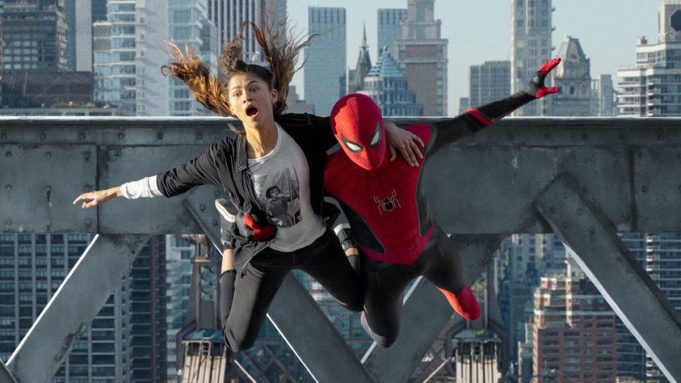
What is Disney’s Spider-Man: No Way Home (2021) about? Well, it’s about a Spider-Man with immense corporate backing and access to state of the art technology who selfishly uses his privilege to pressure Dr. Strange (Benedict Cumberbatch) into altering the minds of everyone on earth for his own comfort and gain. When the sorcerer’s spell misfires and the characters from superior Spider-Man franchises begin to invade Disney’s blockbuster our corporately sponsored Spider-Man (Tom Holland) again abuses his privilege though this time to soothe his ego and conscience at the risk of every human being on earth. To aid him in his self-indulgences this bastion of upper class white values enlists his “man in the chair” Ned (Jacob Batalon) and his girlfriend MJ (Zendaya) along with two working class Spider-Men (Andrew Garfield and Tobey Maguire).
Like Ghostbusters: Afterlife (2021), Spider-Man: No Way Home is concerned with connecting itself to the past; a past of superior, auteur driven filmmaking. In doing this, Disney’s Spider-Man franchise imports the artistic validity of Sam Raimi’s and Marc Webb’s pictures into their visually bland wasteland while also tapping into the strength of their audiences’ nostalgia. It’s really quite the coup for the Disney Corporation to please critics and appease fans simultaneously.
The politics of Spider-Man: No Way Home are antithetical to the source material which has always been based in the George Bailey tradition of “even the most insignificant person’s life has value and impact”. Spider-Man: No Way Home carries on the poor bashing that began in the franchise’s first installment, Spider-Man: Homecoming (2017), which saw Spider-Man acting as his billionaire patron’s agent in a fight against blue collar construction workers forced to turn to crime in order to survive. One can very clearly see how Spider-Man acts as an avatar for Disney; his actions working as a kind of wish fulfillment for the mighty conglomerate’s political ideologies.
It’s deeply troubling to me that these are the lessons that Disney’s Spider-Man is imparting to the young and impressionable fans of the character. Disney’s ability to mass-market sugar-coated quasi-fascist capitalist propaganda is as astonishing as it is diabolical. The Tom Holland led Spider-Man movies are to the MCU what Song Of The South (1946) is to the cartoons of yore.
